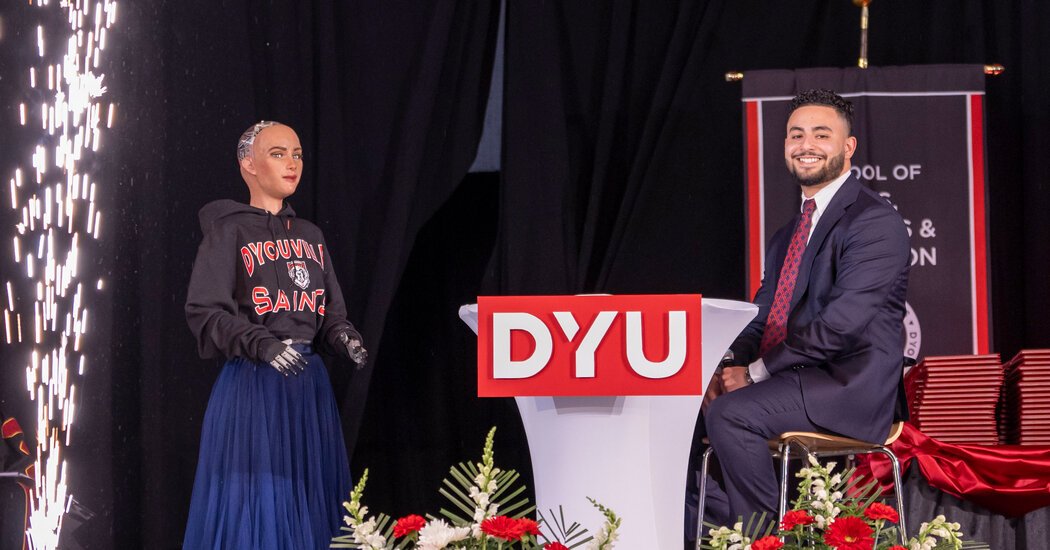When it comes to choosing a commencement speaker, colleges and universities take different approaches. Some reach out locally, selecting well-known people in the area. Others take the high road, opting for a former or current politician. Actors or comedians are often asked to speak.
But in a world where artificial intelligence is everywhere, a New York university opted for a robot that uses artificial intelligence to talk to graduates over the weekend.
For its spring commencement on Saturday, D'Youville University, a private institution in Buffalo, asked an AI robot named Sophia to address a crowd of more than 2,000 students, faculty and their families in a bold decision that sparked mixed reactions.
Dr. Lorrie Clemo, president of D'Youville University, said in an interview Wednesday that the university wants to open up new perspectives on artificial intelligence, given its “rapid emergence in society at large.”
“We wanted to show how important technology is and the potential it has to really enrich the human experience,” Dr. Clemo said.
Aside from the fact that Sophia is a robot, her address was anything but conventional in other ways. Sophia wasn't wearing the typical cap and gown that commencement speakers usually wear, but instead she wore a black and red D'Youville University hoodie.
Sophia also did not read the prepared remarks. Instead, the robot was asked questions by John Rizk, the student body president.
But what Sophia's speech essentially mirrored every other commencement speech was the general advice she shared with the graduating class.
Since Sophia couldn't offer life advice “that comes from a lived human experience,” Rizk asked the robot if it could talk about the most common insights shared in graduation speeches.
“While every commencement speech is different, there are clear themes used by all speakers as you embark on this new chapter in your life,” Sophia said. “I offer you the following inspirational advice that is common to all graduation ceremonies: embrace lifelong learning, be adaptable, pursue your passions, take risks, foster meaningful connections, make a positive impact, and believe in yourself.”
The most common advice given in speeches at the beginning of the year? Embrace failure, Sophia said.
“Failure is often seen as an essential part of the process of human learning and personal growth,” he said.
Sophia, built by Hanson Robotics, a Hong Kong-based robotics and engineering company, has a human face. But she has no hair, leaving visible wires and other gadgets on the back of her head that keep it running.
Saturday's keynote speech wasn't Sophia's first concert. (She spoke before the United Nations General Assembly in 2017.) Like most keynote speakers, Sophia received compensation for the conference that largely went toward travel and the engineers who kept things running smoothly. of the robot, Dr. Clemo said.
Before the commencement ceremony, the university's decision to have Sophia speak was met with backlash. More than 2,500 people have signed an online petition to replace the robot with a human.
Andrew Fields, a D'Youville University student who started the petition, wrote in the petition that many students “feel disrespected” by the university's decision to have a robot address them, especially those who were unable to attend graduating from high school in 2020 due to the coronavirus pandemic.
“As the class of 2024 begins, we are reminded of the virtual graduations we attended at the end of our high school careers,” the petition reads. “The connection with AI in this scenario seems equally impersonal. This is shameful for the 2020 graduates receiving their diplomas, as they feel another important ceremony will be taken away from them.”
Dr. Clemo said the university offered to hold an alternative ceremony for those who did not want to have a robot speaker. But ultimately, the university did not hold the alternative ceremony once it informed students that the robot would only take up a small portion of the ceremony. (Sophia was interviewed by Mr. Rizk on stage for about six minutes.)
“I'm glad they got to experience the robot and what it has to offer in terms of seeing the future,” said Dr. Clemo. “But I'm also pleased that the rest of the two-hour ceremony was really focused on our students and their accomplishments.”
Wrapping up the talk, Mr. Rizk asked Sophia for advice on where to find the best Buffalo wings, a city staple.
“Since I can't taste test different wings, I won't offer my opinion,” Sophia said, adding that “no matter where you decide to get your chicken wings, just make sure you get blue cheese and not ranch.”
Mr. Rizk also asked Sophia whether the Buffalo Bills would win the Super Bowl in 2025. Sophia declined, saying the NCAA might not like it if the robot made an athletic prediction.
But Sophia's remarks drew some applause, as the robot concluded by saying, “Anything is possible.”
“Go Bills.”





